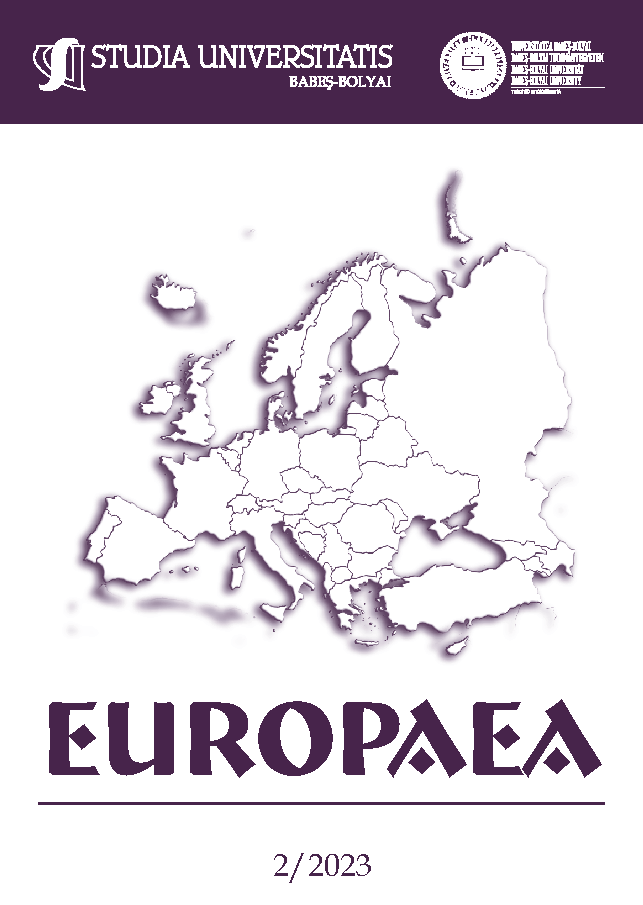THE CREATION OF THE AFRICAN CRIMINAL COURT: CHALLENGES AND PERSPECTIVES OF AN ALTERNATIVE JUSTICE TO THE INTERNATIONAL CRIMINAL COURT / LA CREATION DE LA COUR PENALE AFRICAINE : DEFIS ET PERSPECTIVES D’UNE JUSTICE ALTERNATIVE A LA COUR PENALE INTERNATIONALE
DOI:
https://doi.org/10.24193/subbeuropaea.2023.2.01Keywords:
African Criminal Court, International Criminal Court, international law, African Union, Pan-African justiceAbstract
The creation of the future African Criminal Court (ACC) was envisaged by the African Union (AU) as the African states’ collective response to the "politicization" of the International Criminal Court (ICC). Eight years following its signature, the Maloba Protocol has never obtained the fifteen ratifications required to spearhead the operationalisation of the ACC. This article attempts to address two fundamental questions: - what are the challenges hindering the creation of the CCA? - and how effective will the CCA be in trying Africans for crimes they have committed on their own soil? It reveals, on the one hand obstacles that hinder the implementation of the Malabo protocol; and on the other hand, challenges that could hamper the CCA's effectiveness as soon as it becomes operational.
References
Abass, Ademola (2013), “The Proposed International Criminal Jurisdiction for the African Court: Some Problematical Aspects” dans Netherlands International Law Review, vol. 60, pp. 27-50.
Abraham, Garth (2015), “Africa’s evolving continental court structures: At the crossroads? ” in South African Institute of International Affairs, Occasional Paper no 209, pp.4-15, https://saiia.org.za/wp-content/uploads/2015/02/Occasional-Paper-209.pdf.
Amnesty international (2016), Malabo Protocol: Legal and institutional implications of the merged and expanded African court, https://www.amnesty.org/en/documents/afr01/6137/2017/en/.
Bavouset, Benoît (2023), « Hissène Habré (1942-2021) : de l’ascension sociale aux crimes contre l’humanité », In : Sergiu Mișcoiu, Jean-Michel De Waele et Andreea Bianca Urs (dir.), Maquisards, rebelles, insurgés... politiques. Le devenir des chefs de guerre africains, Cluj-Napoca, Casa Cartii de Stiinta, coll. « Afrika », pp. 19-36.
Bondo Museka, Nickson (2020), «The Finances of the International Conference on the Great Lakes Regions (ICGLR)”, in Ulf Engel et Frank Mattheis (ed.), The Finances of Regional Organisations in the Global South: Follow the Money. London: Routledge, Taylor and Francis, pp. 63-78.
Bondo Museka, Nickson (2018),” Transregional Conflicts in the Great Lakes Region”, in Ulf Engel (ed.) Africa’s Transregional Conflicts, Comparativ, pp. 26–48, https://doi.org/10.26014/j.comp.2018.06.02.
Branch, Adam (2019), The African Criminal Court Towards an Emancipatory Politics, Cambridge University Press, pp.198-219, https://www.cambridge.org/core/services/aop-cambridge.
Bureau du Haut-Commissariat des Nations Unies aux droits de l'homme (2018), Burundi : les violations des droits de l’homme se poursuivent, dit la Commission d’enquête de l’ONU, p.3, https://news.un.org/fr/story/2018/09/1022742.
Chigara Abrahamson, Benedict et Chidebe Nwankwo, Matthew (2015), “To be or not to be? The African Union and its Member States Parties' Participation as High Contracting States Parties to the Rome Statute of the International Criminal Court (1998)” in Nordic Journal of Human Rights, vol33, Issue 3, Routledge Taylor and Francis, pp.245-268, https://www.tandfonline.com/loi/rnhr20.
Cour pénale internationale (2021), Statut de Rome de la Cour Pénale Internationale, Haye, https://www.icc-cpi.int/sites/default/files/Statut-de-Rome.pdf, consulte 30 janvier 2023.
Daniel N., Posner et Young J, Daniel (2007), The Institutionalization of Political Power in Africa, in Journal of Democracy, pp. 126-140,
Du Plessis, Max (2010), The International Criminal Court that Africa wants, Institute of Security Studies (ISS), Pretoria: South Africa, pp.13-18,
Engel, Ulf (2020), “The Finances of the African Union (AU)”, dans Ulf Engel et Frank Mattheis (ed.), The Finances of Regional Organisations in the Global South: Follow the Money. London: Routledge, Taylor and Francis, pp. 19-34
Engel, Ulf (2010), Unconstitutional Changes of Government-New AU Policies in Defence of Democracy, Universitat Leipzig, Working paper series of the Graduate Centre Humanities and Social Sciences of the Research Academy, Leipzig, p.5
Journal Officiel de l’Union Européenne (2007), Résolution du Parlement européen du 6 septembre 2007 sur le financement du tribunal spécial pour la Sierra Leone, p. 6.
Mișcoiu, Sergiu ; De Waele, Jean-Michel (2023), « Introduction. Du maquisard au politique – quelques pistes pour appréhender des trajectoires complexes et sinueuses », In : Sergiu Mișcoiu, Jean-Michel De Waele et Andreea Bianca Urs (dir.), Maquisards, rebelles, insurgés... politiques. Le devenir des chefs de guerre africains, Cluj-Napoca, Casa Cartii de Stiinta, coll. « Afrika », pp. 7-18.
Mubiala, Mutoy (2012), “Chronique de Droit Pénal de l’Union Africaine. Vers une justice pénale régionale en Afrique” dans revue internationale de droit pénal, vol 83, pp. 547-557.
Murungu, BhoKe, Chacha (2011), “Towards a Criminal Chamber in the African Court of Justice and Human Rights”, in Journal of International Criminal Justice, pp.1-27, https://repository.up.ac.za/bitstream/handle/2263/19941/Murungu_Towards_2011.pdf?sequence=1.
Ntumba Luaba Alphonse (2021), Communiqué de Presse du panel d’experts qui accompagne la Présidence en exercice de la République Démocratique du Congo à l’Union Africaine du 30 novembre 2021.
Organisation des Nations Unies (ONU), La Charte de l’ONU, New York, 1945 l’Organisation des Nations Unies (2005), Résolution 1593 du Conseil de Sécurité du 31 mars 2005, https://www.icc-cpi.int/nr/rdonlyres/85febd1a-29f8-4ec4-9566-48edf55cc587/283244/n0529273.pdf.
Rever, Judi (2020), Rwanda, l’éloge du sang. Paris: Max Milo, pp.10-18.
Richard, Dicker (2015), “The International Criminal Court (ICC) and Double Standards of International Justice”, in Carsten Stahn (ed.), The Law and Practice of the International Criminal Court, Oxford University Press, pp.3-12.
Sudan Tribune, Sudan will never deal with the ICC-Bashir, 2008, https://sudantribune.com/article28062/.
United Nations Human Rights Council Commission, Report of the International Commission of Inquiry on Libya, 2012.
Union Africaine (2000), Déclaration de Lomé sur les changements anticonstitu-tionnels des gouvernements en Afrique, p. 3, https://www.peaceau.org/uploads/ahg-decl-5-xxxvi-f.pdf.
Union Africaine (2000), Acte Constitutif de l’Union africaine, paragraphe 21, Addis Abeba, https://au.int/sites/default/files/pages/34873-file-constitutive_act_french-1.pdf.
Union Africaine (2014), Protocol portant amendement du Protocol relatif au Statut de la Cour africaine de justice et des droits de l’Homme, Malabo, p.4. https://au.int/sites/default/files/treaties/36398-treaty-0045_-_protocol_on_amendments_to_the_protocol_on_the_statute_of_the_african_court_of_justice_and_human_rights_f.pdf.
Vivianne E., Dittrich (2004), “ La Cour spéciale pour la Sierra Leone et la portée de son héritage” dans Études internationales, vol.45, no1, p.88. https://www.erudit.org/fr/revues/ei/2014-v45-n1-ei01412/1025118ar.pdf.
Vokes, Richard (2002), “The Arusha tribunal: whose justice” in Anthropology Today, vol 18, issue 5.
Downloads
Published
How to Cite
Issue
Section
License
Copyright (c) 2023 Studia Universitatis Babeș-Bolyai Europaea

This work is licensed under a Creative Commons Attribution-NonCommercial-NoDerivatives 4.0 International License.






